U.S. Embassy: Next Year in Jerusalem?
Hopefully the promise will be kept.
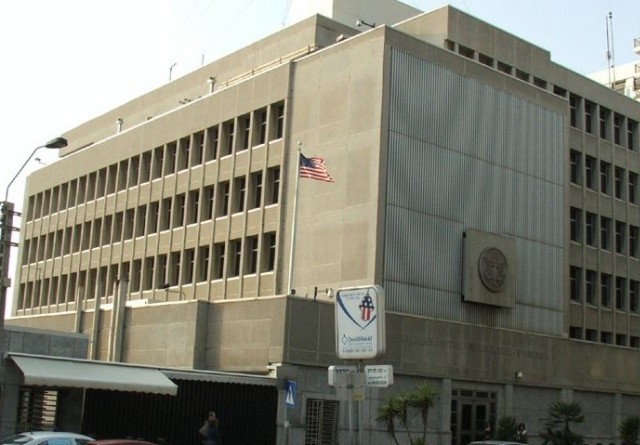
President-elect Donald Trump campaigned on a promise that the United States would officially recognize Jerusalem as the capital city of the Jewish state.
He also vowed that when he became president he’d relocate the U.S. embassy from its current beachside location in Tel Aviv to the Holy City.
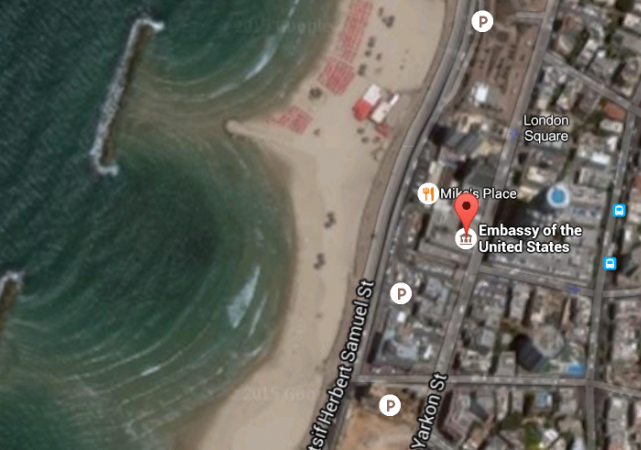
Now, some are saying that once he’s in the Oval Office, Trump will go back on his word.
In his outspoken reaction to the U.S. election results, PLO Executive Committee member Tayseer Khaled called Trump a liar, predicting that contrary to his promises, he wouldn’t transfer the embassy.
Even one of Trump’s own advisors is reportedly skeptical that the move will happen anytime soon. In an interview for BBC radio which was also publicized by CNN last Thursday, Walid Phares added a “caveat” to Trump’s campaign pledge: he would relocate the embassy, but only after a “consensus” had been reached.
So will Trump do what he said he’d do?
As I discuss further below, there’s a very good chance that among the Trump administration’s first moves will be to follow through on a campaign promise that his predecessors have reneged on for the last two decades.
Stalling on the Will of the American People
As we noted in an earlier post, moving the embassy would break with over two decades of bipartisan White House policy to circumvent the Jerusalem Embassy Act of 1995, a law that passed by wide margins (93-5 in the Senate and 374-37 in the House). It calls for Jerusalem to remain an “undivided city” and for the U.S. to recognize it as Israel’s capital.
It also stipulated that the embassy be moved no later than May 31, 1999.
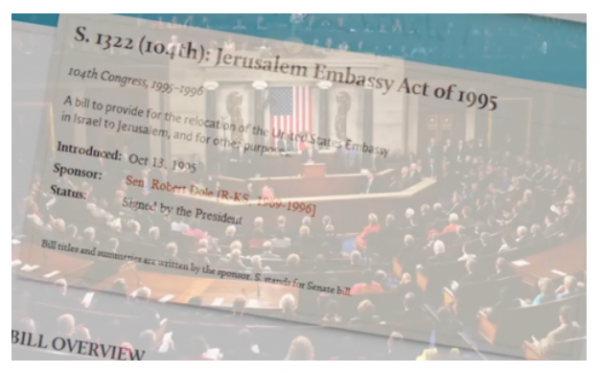
For years presidential hopefuls have been vowing to move the embassy as required by law. But then, once in office, they invariably fail to honor the commitment made on the campaign trail.
The campaign promises keep getting broken because successive administrations have been reluctant to formalize the relocation, continually citing concerns that the move would upset the prospects for a peace deal between Israel and the Palestinians.
Basically, as explained in the prior post, presidents have been relying on a national security waiver built into a 1995 law, which gets used at regular six month intervals and gives them an opportunity to suspend the embassy move.
Here’s a copy of the standard text that’s been sent like clockwork to the Secretary of State:
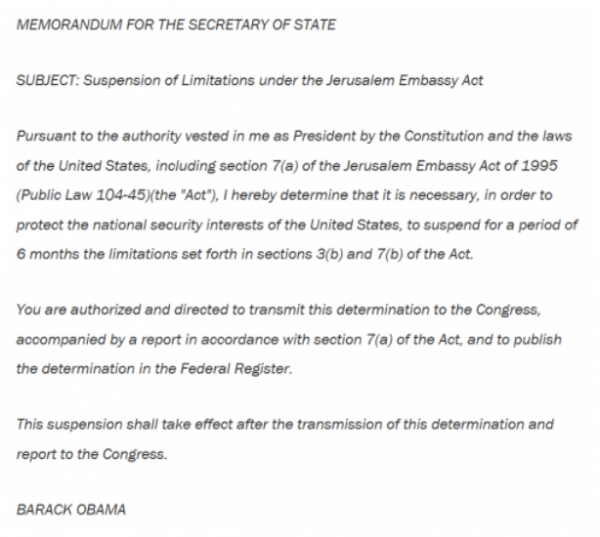
So Bill Clinton, George Bush, and Barack Obama have routinely blocked the relocation of the embassy while saying that the U.S. is still committed to doing it.
Meanwhile, Congress continues to periodically call for the move (see here and here).
Trump Promises to Move the Embassy
Back in March, at the American Israel Public Affairs Committee (AIPAC) policy conference in Washington, D.C., one of the biggest applause lines in Trump’s remarks was his promise to move the U.S. embassy from Tel Aviv to Jerusalem:
We will move the American embassy to the eternal capital of the Jewish people, Jerusalem”.
Donald Trump at #AIPAC2016: We will move the U.S. embassy to Jerusalem https://t.co/1B5t7h3Xkg https://t.co/p64qluN4SK
— CNN (@CNN) March 21, 2016
Since then, Trump, his advisors, and even his family members have doubled-down on the guarantee.

Credit: Time
Last month Trump’s daughter Ivanka, speaking at a synagogue in Florida, told its members that her father would “100 percent” following through with his promise if he was elected.

Then, the pledge to transfer the embassy was featured in a policy statement on Israel released a week before the elections.
And in an interview for the Jerusalem Post last Wednesday, David Friedman—an advisor on Jewish and Israel-related issues who is a contender to become the next U.S. ambassador to Israel under Trump—confirmed that his boss was committed to move the embassy:
It was a campaign promise, and there is every intention to keep it.”
Trump Israel advisor tells me: Embassy to move to J'lem, hostility over and Trump will be Israel's best friend ever. https://t.co/Dd2CPOLm1W
— Yaakov Katz (@yaakovkatz) November 9, 2016
Another senior advisor, Jason Greenblatt, repeated those words on Israel’s Army Radio last Thursday too:
When Trump gives his word he stands by it. For Israel, he recognizes the right of the Jewish nation to preside in its eternal capital of Jerusalem and is revolted by UNESCO’s decision on the matter.”
Israeli leaders congratulate Trump, then tell him to hurry up and move U.S. Embassy to Jerusalem https://t.co/S5oPYhMFUN
— The Washington Post (@washingtonpost) November 9, 2016
Mazal tov from #Jerusalem, Mr. President! @realDonaldTrump #ElectionDay pic.twitter.com/L05W8HFNnd
— Archive:Mayor Nir Barkat (@ArchiveNir) November 9, 2016
Why President Trump Will Move the Embassy
There are at least 3 good reasons to be confident that in his term as President, Trump will keep his promise to transfer the embassy:
-
Trump Thinks Peace Will Remain Elusive Unless the Palestinians Accept Jewish Attachments to the Holy City
Trump stands opposed to the vehemently anti-Israel international diplomatic campaign, especially at the United Nations, which delegitimizes the country, imposes discriminatory standards, and ignores Israel’s “3,000-year bond to its capital city.”
He thinks that it’s the false narrative that the Jewish people have no connection to their ancient homeland, and no connection to their holy sites in the capital city, that needs to change if peace is ever going to be possible.
Moving the U.S. embassy to Jerusalem won’t transform this ingrained world view overnight.
But it could help. And Trump probably would see it as advancing (rather than hindering) his blueprint for “reaching a comprehensive and lasting peace.”
-
Trump Doesn’t Think Jerusalem is a Settlement
In Trump’s view, Israel’s housing communities beyond the 1949 Green Line aren’t obstacles to peace. But even more germane to whether he would back out on his pledge to relocate the embassy is the fact that Trump doesn’t think that Jewish neighborhoods in east Jerusalem should be labeled settlements in the first place.
According to Trump’s policy statement on Israel:
the U.S. will recognize Jerusalem as the eternal and indivisible capital of the Jewish state…”
If the western and eastern halves of Jerusalem form an organic, indivisible whole, as enshrined by Israeli law, then there’s no reason to be concerned about how moving the embassy to the western part of the city would impact the possibility for dividing it in a final peace deal.
The problem becomes moot, because Trump doesn’t see Israel as an illegal occupier and thinks the city should remain unified under Israel’s sovereignty. So the embassy can be relocated without having any bearing on direct, bilateral peace talks.
-
Trump Isn’t Likely to Care about Opposition from Israel Haters
Trump thinks that the Israeli-Palestinian conflict persists primarily because the Palestinian leadership incites to violence and refuses to accept Israel’s right to exist as the homeland of the Jewish people. Given this viewpoint, it’s hard to see why he would reach the conclusion that relocating the embassy to Jerusalem, in compliance with U.S. law, would prevent Israeli-Palestinian talks on the two-state solution.
To be sure, the Trump administration would labor under no illusions that the decision would be warmly welcomed in the Middle East. That push-back is already happening:
#Saudi Prince Turki : "If #Trump moves US embassy in #Israel to Jerusalem, OIC (57 countries) will withdraw ambassadors from Washington."!!
— Joyce Karam (@Joyce_Karam) November 10, 2016

Credit: Al Arabiya English
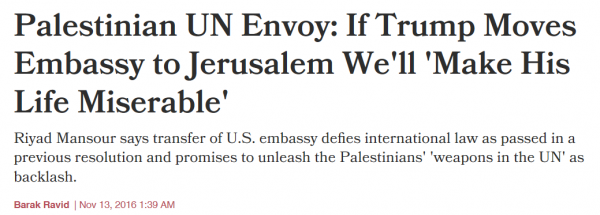
Credit: Haaretz
But President Trump isn’t likely to cave in the face of threats. Those who would refuse to accept, or recognize the need for, the move will be the sort of people that in his view America has no business supporting anyway.
Last week Hamas political head Khaled Mashaal reportedly voiced his opposition to Trump’s campaign pledge, warning him that he was “playing with fire” and vowing to “seize and liberate” Jerusalem and the “entire land of Palestine.”
It’s difficult to imagine President Trump revising his decisions based on what a designated U.S. terrorist group had to say about them.
Moving the Embassy for the Sake of Peace
Far from undermining the prospects for an Israeli-Palestinian peace, moving the embassy could be exactly the kind of game changer that’s needed to revive negotiations. Specifically, it could jumpstart the moribund peace process by incentivizing the Palestinian Authority to end its “diplomatic blitz” against Israel at the United Nations.
The relocation would send a strong message to the Palestinians that, from the perspective of the United States, it’s time to get back to the business of face-to-face bilateral talks.
Based on a close reading of his policy statement on Israel, his own remarks, and those of his aides and family members, it’s clear that Trump—a master of the ‘art of the deal’—appreciates this logic, and how transferring the embassy to Jerusalem could incentivize a return to the negotiating table.
Now, the lame duck Obama administration is apparently going to try hard to disabuse Trump of its merits.
At last week’s State Department briefing, deputy spokesman Mark Toner noted that the Obama administration would make sure that President-elect Trump understood the “rationale behind exercising the waiver” in order to keep the U.S. embassy in Tel Aviv:
since Israel’s founding, the administrations of both parties have maintained a consistent policy here and that is recognizing no state as having sovereignty over Jerusalem.”
Basically Toner was referencing a long-standing view that balks at moving the embassy on the grounds that it would prejudice Jerusalem’s final status.
The argument goes like this: If the United States were to move its embassy in the absence of a peace deal, it would be seen as a provocative act because it would prejudge the outcome of negotiations on the city, and would thus stymie the opportunity for conflict resolution.
It’s a specious line of reasoning. Actually, it has the whole thing back to front. The provocative act is to not officially acknowledge that Jerusalem is Israel’s capital, which gives the Palestinians license to dig in their heels and make outrageous demands.
Trump seems to get that.
Conclusion
Jerusalem is the capital city of the state of Israel, and for the U.S. not to officially recognize this doesn’t do anything to advance the prospects for peace.
All it does is insult Israelis and Jews across the planet.
President-elect Trump, who views Israel as a “staunch ally” and a “ray of hope” to the world, says he’d like to help broker the “ultimate peace deal”—but one that would not denigrate nor deny the Jewish connection to Judaism’s historic capital, or prevent Jews from making their homes and living out their lives there.
Trump hails Israel as ‘beacon of hope’ https://t.co/P5UlV7SwFT
— The Times of Israel (@TimesofIsrael) November 11, 2016
Trump: Israeli-Palestinian peace would be 'ultimate deal' https://t.co/cNF2AV9p8k #IsraelNews pic.twitter.com/1TAee7Yxa8
— The Jerusalem Post (@Jerusalem_Post) November 12, 2016
These aren’t the views of a President who is likely to renege on his campaign promise to move the U.S. embassy to Jerusalem.

Add to this the fact that Trump has the sort of leadership style and personal bravado to make it happen (his key aide reportedly said that Trump would ‘fire’ any ‘Arabists or lifelong bureaucrats at the State Department’ who would tell him the move is ‘impossible’).
Trump would also have full backing from the now Republican-dominated Congress. These are Republicans who just changed their party platform to eliminate any mention of the two state solution; recognize Jerusalem as the unified capital of the Jewish state; and reject the notion that Israel is an occupier in the West Bank. So they’re going to be totally behind the relocation.
https://twitter.com/therealroseanne/status/796379584597893120
Under these conditions, the embassy staying put in Tel Aviv during President Trump’s term would actually be the more surprising outcome.
———————
Miriam F. Elman is an Associate Professor of Political Science and the Robert D. McClure Professor of Teaching Excellence at the Maxwell School of Citizenship & Public Affairs, Syracuse University. She is the editor of five books and the author of over 60 journal articles, book chapters, and government reports on topics related to international and national security, religion and politics, and the Israeli-Palestinian conflict. She also frequently speaks and writes on the Boycott, Divestment, and Sanctions (BDS) anti-Israel movement. Follow her on Twitter @MiriamElman
Donations tax deductible
to the full extent allowed by law.

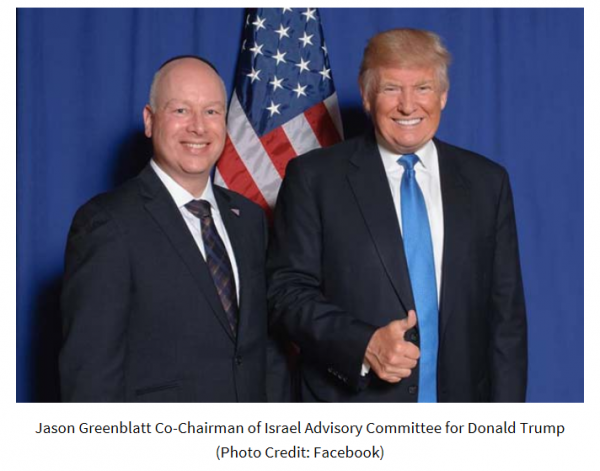







Comments
And it gives Trump a chance to build a building as a solid and visible legacy.
I’ve heard he likes to do that.
I’ll believe it when I see it.
Let me start off by saying that if I wasn’t married and had nothing to live for, I would join the IDF. I’m a former Marine with expertise in MOUT training, although I’m sure much of that doctrine we stole from the Israel. Ironic. Anyways…
“For years presidential hopefuls have been vowing to move the embassy as required by law. But then, once in office, they invariably fail to honor the commitment made on the campaign trail.”
Something is happening here. What? Its like they each get an intel briefing that changes their mind, or someone turns them in some way. Why does leadership from both party’s keep changing their mind soon after they are sworn in as President?
Do we have a building that the embassy can move into?
I’m sure the Israelis will have NO problem finding a building site for us to use.